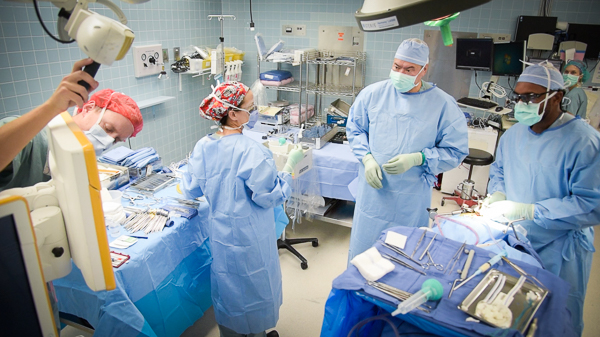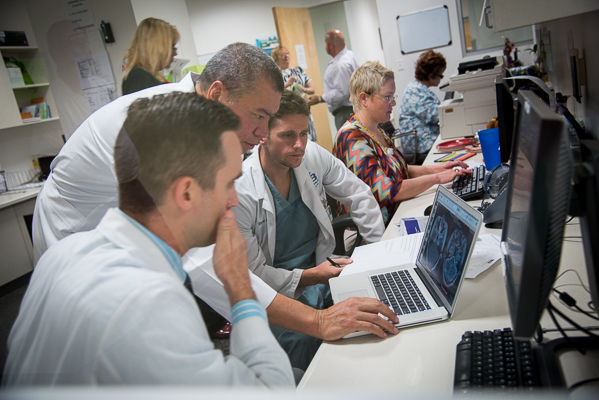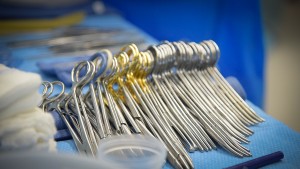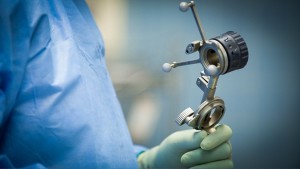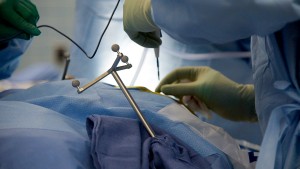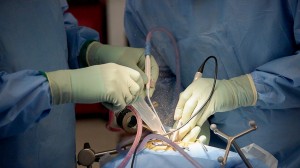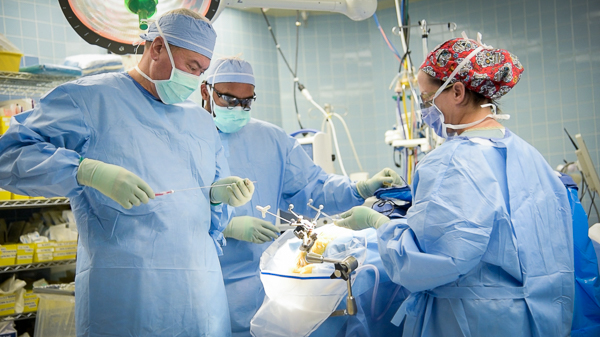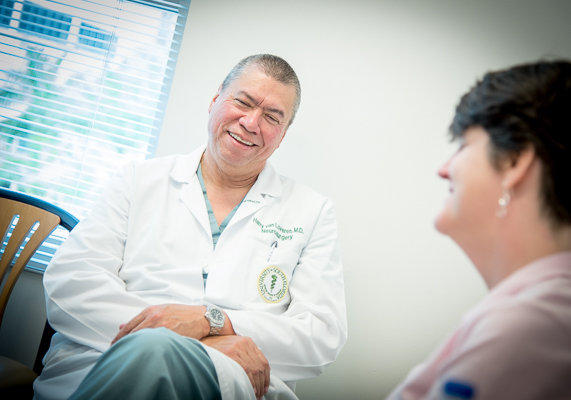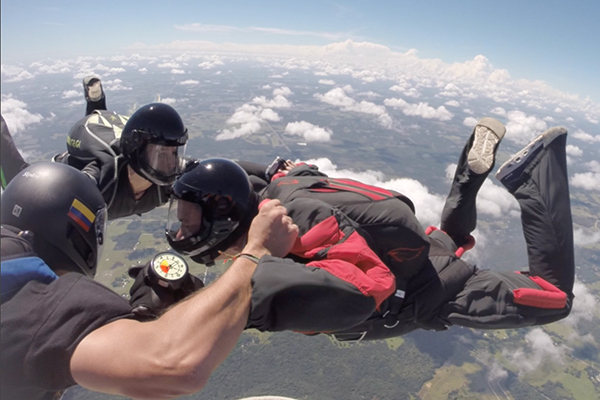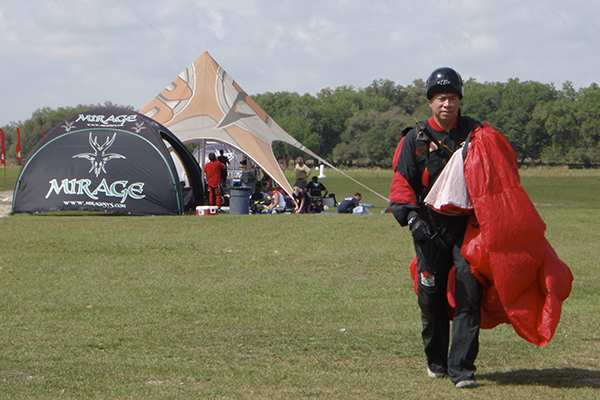This story is part of a series highlighting faculty who are shining examples of quality and compassionate patient care and patient safety. Every day, these health care providers put their patients first. In the process, they create successful models of advanced care focused on empathy, safety, technology and evidenced-based medicine, models that carry through everything they do – into their practice, their teaching, their research, their community outreach, and into the USF Physicians Group.
Over and over again, Harry van Loveren, MD, walks through a surgery in his mind before actually cutting open the brain of his patient, perfecting every step and accounting for everything he will encounter, the expected and the unexpected.
Dr. van Loveren is chair of the Department of Neurosurgery in the USF Health Morsani College of Medicine, senior associate dean for Surgical Subspecialties at USF Health, and chief medical officer of the USF Physicians Group. Along with a brilliant mind and capable hands, his visualization technique has made him an accomplished and much sought after neurosurgeon.
“To prepare for the kind of operations I do you have to mentally do the operations a number of times before you walk into the operating room,” he said. “And you have to understand it all – the anatomy, the surgical instruments, the surgical techniques – so your mental experiments are valid, that what you see in your mind is what you will see in the patient’s head. That these things you see in your mind are true and that if it works in your mind it had better work in the operating room. And if I can’t see that in my mind’s eye, I go back to the (training) lab, go back to text books, and review videos and figure it out until I can create a paradigm in my mind where I complete the surgery successfully.”
How does someone decide to become a neurosurgeon? For Dr. van Loveren, it was because it’s considered the most difficult area of medicine and requires the longest amount of training.
“To be honest, I don’t know why other people go into neurosurgery but I know why a lot of us do – because we’re so egotistical and because we want to be the best,” he said. “As we’re going through medical school we look around and ask what would be the hardest thing I could do? What would be the biggest challenge? But I don’t think we’re the only ones who do that. For instance, look at people who go into the police force and say ‘I want to be on the SWAT team’ or go into the military and say ‘I want to be a Navy SEAL.’ There’s an element of that to becoming a neurosurgeon. We’re looking for the greatest challenge.”
Meeting that challenge has made him one of the most sought after neurosurgeons in Florida.
In fact, when he joined USF Health about 10 years ago, he set a goal for his Department to become the go-to neurosurgery department in Florida. Starting with only six neurosurgeons, he has built the Department to about 30 surgeons and nine PhDs, becoming a hub for the most complicated cases.
“My practice is a little bit unique,” he said. “It’s called complex cranial so I do the more complex side of brain operations and a lot of my practice is taking care of patients for other neurosurgeons in the state either for those things they don’t want to do or don’t feel they ought to be doing. That can be a bit of a lonely and frightening position to be in. But nobody wants to see any lack of confidence in us and we don’t really want to feel that lack of confidence.”
His other reason for choosing neurosurgery is because he saw it as the one specialty in which he would never stop learning.
“I chose it because it looked like my learning curve would go on forever,” he said. “When I looked at neurosurgery, I saw older neurosurgeons still making great contributions and the acquisition of experience is so valuable to neurosurgery. So the finish line is, wonderfully, always just beyond our reach.”
He admits, though, that the real reason he chose neurosurgery might truly be because he thinks “the brain is cool.”
“The brain is who we are, it’s what we think, it’s what we believe,” he said. “The ability to affect a person’s life by manipulating that organ is profound and extremely interesting. And we really get some insight into brain function when we’re operating on someone while they’re awake and speaking to you. And with certain stimulation you can bring back very specific old memories for the patient, you can play music, you can run videos. It’s all stored in the brain and you can recall it and make it come out for the patient.”
With a laugh, he added “It’s just a really satisfying career. You should try it sometime.”
By taking some of the most difficult brain surgery cases – the ones other neurosurgeons feel might be outside their scope and skill – Dr. van Loveren has built a solid reputation for helping some of the most vulnerable patients, those whose conditions might otherwise be deemed inoperable. That reputation is based on knowledge and surgical skill, but also involves his ability to relate to patients, to calm them and impart feelings of comfort, but also confidence.
“Taking care of patients, taking care of people, is what this is all about,” he said. “What I try to do is make people feel the way you might feel if you had a serious brain problem and your brother was a neurosurgeon. That kind of comfort level, that your brother is someone you know, someone you trust, someone who knows you, someone who cares about you, and everything your brother tells you will be the truth and the best for you. That’s my approach with patients. With the family and the patient there’s the ability and the need to walk in and say hello and reassure them that I see them, that I’m aware of and care about who they are and how afraid they are, that I’m fully focused on them, that I care. I let them know this is not just another case. And I let them know a little bit about myself, reveal my human side. I hope they gain some comfort from that interaction.”
All this intensity can make for only serious conversations but in chatting with Dr. van Loveren, you will quickly see other sides, including his love for skydiving. In fact, he admits that freefalling to the earth is the only activity he has found that lets him completely stop thinking about neurosurgery.
“Brain surgery is always with you,” he said. “You’re always thinking, wondering, analyzing, or performing surgery. You’re always being nudged by your wife walking down the beach and she says ‘where are you now?’ Which is one of the reasons I’m a skydiver. It is a profound break in concentration and lets me focus completely on something else. I’ve tried a lot of things, from golf to fishing, to be distracted. But I find that throwing the door open at 14,000 feet and getting out of the airplane, that’s when neurosurgery stops for a while.”
Story by Sarah Worth, photos and video by Sandra Roa and Mihaela Madsen, USF Health Office of Communications.

